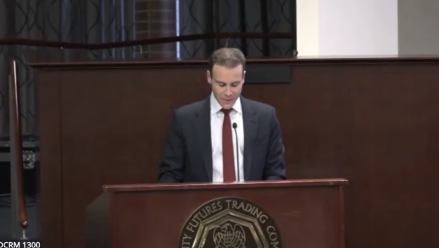Congress’ decision to bring in a surprise 90% cap on deductible losses for gamblers earlier this month has left many high-volume sports bettors wondering how to ensure their pastime — or job, for some — can remain viable.
There’s been discussion of the definition of a “session” of gambling or hopes that lawmakers will simply realize their mistake and repeal the provision.
But among the simplest proposed solutions is to just switch to a prediction market.
Unlike traditional sportsbooks, prediction markets like Kalshi are regulated by the Commodity Futures Trading Commission (CFTC) and these exchanges argue their contracts — even on sports — are “swaps,” a form of financial product.
So that means winnings should be taxed as capital gains, with all losses being deductible, right?
Well, maybe.
“There’s a lot of uncertainty about not only the regulatory side, but the tax side as well,” Robert Stoddard, lead U.S. tax partner for gaming at KPMG, tells InGame.
The truth is that it’s not entirely clear how prediction market trades should be taxed.
“We kind of have two sets of potential frameworks for the people who are buying and selling these contracts,” Stoddard says. “One is the more traditional commodities or futures trading and the other is under a sports bet.
“And at least as of today, there’s been no definitive guidance as to whether this or it’s that.”
But currently, Kalshi issues form 1099-B to its users — the same form used by stock-trading brokerages such as Robinhood — treating winnings as trading income. That means these winnings would be a form of capital gains, with a more favorable deduction regime than sports betting.
Under those rules, not only can Kalshi users deduct losses up to the full value of their “winnings,” but they can also carry over losses from a bad year to offset more successful future years. In addition, trading losses can be deducted from capital gains from other investments.
Waiting for action
In the short term, that tax system might well go unchallenged. But in the longer term, will prediction markets remain free from sports betting tax rules?
It’s not totally clear.
The IRS may be hoping to follow the lead of the CFTC.
“Will the CFTC definitively say this is sports betting? Will they say it’s not sports betting? Will they say nothing?” Stoddard asks.
“The most important questions follow from the regulatory questions. In other words, you’re basically waiting for clarity to say this is or isn’t sports betting.”
But what if the regulator continues to say nothing? That would — absent a court ruling saying otherwise — allow Kalshi to keep offering sports event contracts in all 50 states, but would it mean they couldn’t be taxed as sports betting?
“I think what’s kind of interesting here, if you see this,” Stoddard says.
It’s also not without precedent in the world of sports betting. In 2020, the IRS issued new guidance concluding that daily fantasy entry fees are “wagers” under the Internal Revenue Code — and therefore subject to federal excise taxes on wagers — even though the question of whether the contests are sports betting is something that still appears undecided even in 2025.
And when you really think about it, the line between traditional financial products and gambling can get very, very blurry at times.
“Many decades ago, there was debate as to whether commodities trading itself was a gambling transaction,” Stoddard says. “That was something that was discussed during a congressional debate. I think from a strict perspective, we’ve seen some logic to that argument. Ultimately, that obviously is not where they landed on.”
There could also be a possibility that the CFTC or courts rule that sports event contracts are a form of gaming, but a form that’s allowed under the Commodity Exchange Act (CEA) — that’s an argument that Kalshi has put before a court. If that’s the case, the IRS wouldn’t have a clear lead to follow. How would it act without clear guidance from another body? It’s hard to tell.
Rules only get more complex
There’s a number of other issues to consider, too. Under Section 1256 of the tax code, most regulated futures contracts should be “marked to market.” That means the contracts are treated as if they’re worth their market price at the end of the tax year, rather than being worth what a trader may have paid for them.
If that applies to sports event contracts, then a bet that is still open at the end of the year would be taxed based on its value when the year ended. In other words, if the odds for an event you bet on shorten, you could be taxed on winnings that haven’t been realized yet.
Meanwhile, a person who makes money from financial products can be classed as either an “investor” or “trader,” depending on how actively they buy and sell certain securities. Traders, who make more day-to-day decisions, tend to get more favorable deductions. If sports event contracts are financial products, who is “investing” in them and who is “trading”?
On the other hand, if Kalshi trades are sports bets, then each trade would presumably be subject to the excise tax on wagers. But currently, that tax is 0.25% for legal wagers and 2% for illegal wagers. While Kalshi is regulated, Stoddard notes a “potential risk” that wagers made in states where sports betting isn’t legal would be judged as illegal wagers. That’s how the tax has been applied for daily fantasy sports.
“There’s extra layers to the argument here,” Stoddard says. “This is why we think this will probably take many years.”
Until then, though, prediction markets seem a better deal from a tax perspective. The question will be if that lasts.
“I think in the interim, there’s obviously a vested interest for these companies, the companies that are offering these contracts, which also offer other regulated exchange contracts,” Stoddard continues.
“I think what we’re seeing right now so far is that these exchanges just sort of treat it similarly to other CFTC regulated futures and commodities contracts. But I have heard that there’s some diversity in practice.”





